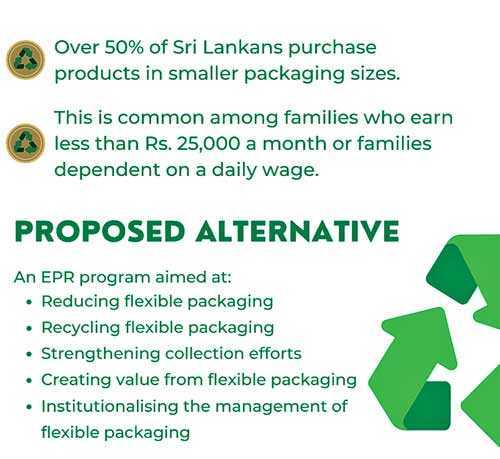Thursday Feb 19, 2026
Thursday Feb 19, 2026
Tuesday, 23 March 2021 00:00 - - {{hitsCtrl.values.hits}}
 The Ceylon Chamber of Commerce (CCC) and industry stakeholders propose an Extended Producer Responsibility (EPR) initiative as a more cohesive alternative to addressing the environmental issues created by flexible packaging in Sri Lanka.
The Ceylon Chamber of Commerce (CCC) and industry stakeholders propose an Extended Producer Responsibility (EPR) initiative as a more cohesive alternative to addressing the environmental issues created by flexible packaging in Sri Lanka.
The Chamber and the private sector believe that adopting an EPR approach to the issue, instead of banning flexible packaging altogether, would allow consumers to continue to benefit from the advantages flexible packaging bring.
Propelled by the COVID-19 pandemic, the flexible packaging industry has seen unprecedented growth due to the increase in demand for both food and non-food products globally. Considering the importance of retaining smaller and affordable packaging sizes in Sri Lanka’s economy, the Ceylon Chamber, in collaboration with industry stakeholders – including packaging suppliers, manufacturers (food, non-food) and retailers – propose an EPR approach to address the environmental issues created by this form of packaging.
EPR is a concept practiced globally where the responsibility of collecting, processing and recycling waste is undertaken by producers (brand owners, packaging suppliers, manufactures and retailers). Studies show that EPR helps reduce the burden of waste management on government authorities, and is practiced in countries like Indonesia, India and Japan to share the responsibility of recycling packaging waste. According to the industry, around 50% of Sri Lanka’s consumers purchase products in smaller packaging sizes, where the choice is available. This consumption trend is common among families who earn less than Rs. 25,000 per month, families who are dependent on a daily wage, and individuals who use community facilities such as hostels and boarding. “It is important that we retain smaller and affordable packaging sizes within the market as this allows consumers of different socio-economic groups to have access to products. Smaller sizes and flexible packaging means that products can be sold at different price-points and give the end consumer, choice. We need to ensure that we look towards a sustainable alternative to the issues of plastic waste. EPR is one such alternative,” noted Ceylon Chamber of Commerce Secretary General and Chief Executive Officer Manjula de Silva.
The proposed EPR program is designed to reduce flexible packaging and strengthen flexible packaging recycling efforts. Members are exploring EPR mechanisms from a pool of options such as the use of distribution logistics systems to collect back used packaging; installing equipment to trap trash from canals and rivers; using mainstream and social media towards consumer education campaigns; increasing the recyclability of flexible packaging, and supporting municipalities to segregate non-recyclable waste and utilise the same in energy generation. For this year, collection programs are targeting to collect back at least 25% of the equivalent of flexible packaging released to the market in 2021 and progressively increase the collection to near 100% collection.
“Industry partners have come forward to share the responsibility of managing the waste issues created by flexible packaging in the country. Some have adopted tried and tested models and we are looking to help the industry reach these goals faster through synergy, collaboration and partnership. We expect companies that generate a larger amount of packaging waste to take the lead in solving this problem, while smaller companies catch up on these initiatives,” de Silva said.
The program aims to create more value for flexible packaging, and elevate the ‘Alliance for Sustainable Packaging’ as a Producer Responsibility Organisation (PRO), institutionalised to manage flexible packaging.
“EPR would provide a solution to the environmental problems faced due to improper disposal and leakage of plastic waste. Our proposed mechanism aims to drive habitual change and increase the collection and recycling rates of flexible packaging in the long term by giving the industry the responsibility of ensuring that the packaging used in the market is disposed of and recycled properly. We hope that this holistic approach to waste management would help consumers to continue to experience affordable products, while also creating value out of waste,” he added.